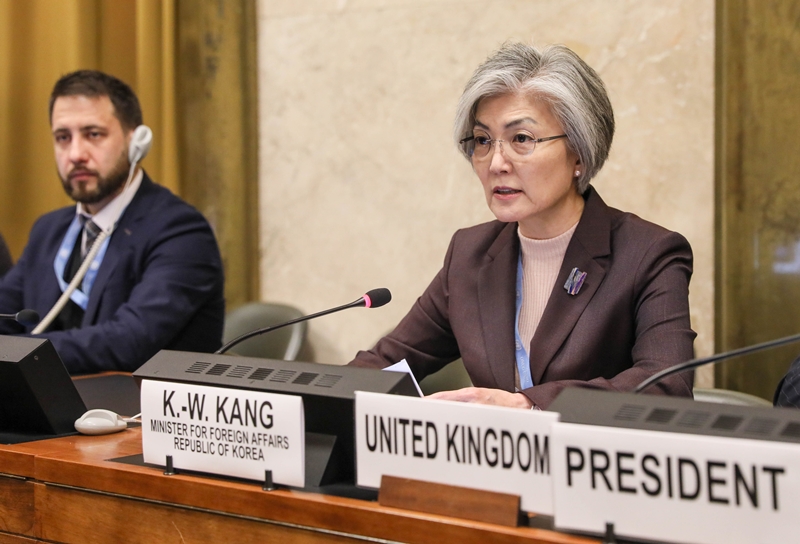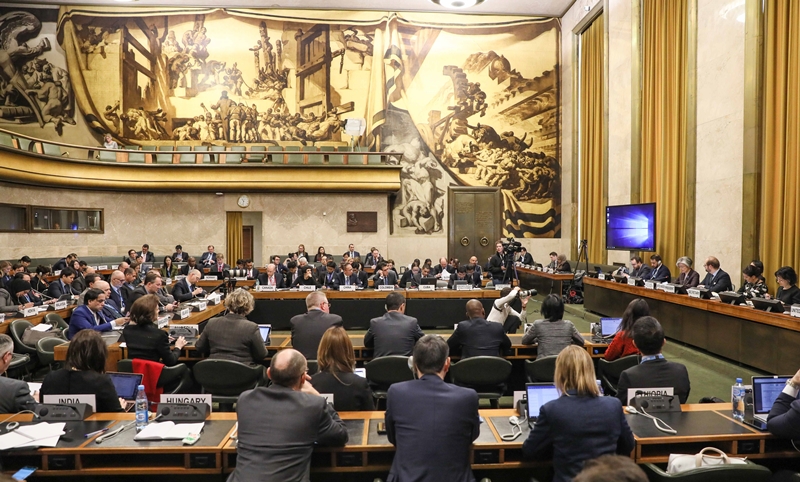연설문
제네바 군축회의(CD) 고위급회기 연설
- 작성일
- 2019-02-26 09:34:43
- 조회수
- 18018


Remarks by
H.E. Kang Kyung-wha
Minister of Foreign Affairs of the Republic of Korea
Conference on Disarmament
25 February 2019
Mr. President,
Distinguished delegates,
I am delighted to be back at the Conference on Disarmament, as this august body celebrates its 40th anniversary.
Forty years ago, during the dark days of the Cold War, amid a desperate need to curb the escalating arms race and a rising nuclear stockpile, the first Special Session of the UN General Assembly devoted to Disarmament (SSOD-1) was convened in 1978. The CD was thus born and since then, the CD made vital contributions to international peace and security by producing milestone disarmament instruments, such as the Chemical Weapons Convention (CWC – 1993) and the Comprehensive Nuclear Test-ban Treaty (CTBT – 1996).
However, for the past two decades, the CD has fallen into a deep slumber, even as the world has gradually slid into an increasingly complex and volatile security environment.
Moreover, military spending has reached its highest peak since the end of the Cold War, while several disarmament bodies in Geneva are suffering from budgetary difficulties. Long-enshrined norms such as the prohibition of the use of chemical weapons have been repeatedly violated.
The expansion of human activities into outer space and cyber space, combined with the rapid evolution of new technologies such as artificial intelligence, hypersonic weapons, and digital interference capabilities, has further complicated the international security landscape. And, the world watches closely as the fate of the INF Treaty and its potential impact on the whole disarmament architecture unfold.
And yet, we are seeing an erosion of consensus within the global disarmament community. The loss of consensus on numerous UN General Assembly resolutions last year is a testimony to the growing schism among countries.
At such a time, more so than ever, the CD, as the single multilateral disarmament negotiating forum, must leverage its institutional memory and face up to this new reality.
In this regard, I would like to commend the works of the subsidiary bodies and their substantive work last year, while we continue our efforts to agree on a Program of Work. We must keep up the momentum and shore up the relevance of the CD, for which a more realistic, flexible and practical approach is needed. I welcome the works of the UK Presidency to this end. It would also be useful to consider and discuss expanding its membership and promoting the efficiency of the current working method.
The CD should go further and contribute to the 2020 NPT Review Conference. We can ill afford another failure, but concerns are already high that we are yet to see tangible progress to ensure the success of the upcoming Review Conference. In this context, my government finds the Fissile Material Cut-off Treaty (FMCT) as an issue to which the CD could make substantial and immediate contribution, based on the works of the High-level Expert Preparatory Group.
Also, as the CD continues discussions on various issues, I hope it will be mindful of the implications of disarmament for the Sustainable Development Goals, as laid out in the Secretary General’s Agenda for Disarmament. My government will support his efforts in any way we can, including through the annual ROK-UN Disarmament and Nonproliferation Conference.
Mr. President,
Distinguished delegates,
During the past year, the developments on the Korean Peninsula have been a distinctively positive news for the global security community. An epicenter of global instability for many decades, the Korean Peninsula has changed course and become a source of hope. If my remark on the DPRK last year at the CD expressed “cautious hope”, this year, I am glad to say that I bring a message of “progress and expectation”.
The three Inter-Korean Summits and the first-ever US-DPRK Summit last year brought about a historic shift on the Korean Peninsula, from a long-entrenched paradigm of confrontation and hostility to one of peace and dialogue. Through these historical engagements, the top leaders of the two Koreas and the United States agreed to work together to realize a nuclear-free and peaceful Korean Peninsula.
The agreements have been followed up with confidence-building measures, such as the return of MIA remains from North Korea to the United States, and the two sides have continued the engagement at high and working levels.
Between South and North Korea, a military agreement to reduce tension and eliminate the chances of accidental clashes has been implemented – for example, to tear down several guard posts on the two sides of the military demarcation line, to designate no-fly zones, to disarm the Joint Security Area around Panmunjeom, and more.
Inter-Korean dialogue has become active in other areas as well. And North Korea has repeatedly committed to complete denuclearization, and indicated its readiness to dismantle key parts of its nuclear and missiles program in return for corresponding measures to guarantee its security.
In just a few days the 2nd US-DPRK Summit will take place in Hanoi. We expect it to be another important milestone in our efforts to achieve complete denuclearization and establish permanent peace on the Korean Peninsula. We look forward to tangible and substantial results coming out of this meeting.
In the meantime, my government has been fully implementing the relevant UN Security Council resolutions and will continue to do so until we are assured that we are firmly and irrevocably on our way toward complete denuclearization. In pursuing inter-Korean cooperation, we are doing so in faithful adherence to the Security Council sanctions.
Mr. President,
Distinguished delegates,
Faced with the dark realities of his days, Martin Luther King once said that “we must accept finite disappointment, but never lose infinite hope.” I find this remark to be very relevant to both the CD and the Korean Peninsula.
The CD has been a disappointment for a long time, and the worsening geostrategic environment signals more turbulence ahead. But the CD was born amid even grimmer realities and has pushed through troubling times. We must not lose hope of finding a way to restore its credibility. If a major breakthrough is out of reach for now, we should continue to lay down small stepping stones, such as furthering the works of the subsidiary bodies.
As for the Republic of Korea, against many odds and disappointments, we opened a new road to peace through convention-defying leadership and vision. We are determined to stay the course until we achieve complete denuclearization and establish permanent peace on the Korean Peninsula. And we will build on these efforts to continue the work with the international community to reinvigorate the CD.
Thank you very much. /END/
-------------------------------------------(비공식 국문 번역문)-------------------------------------------
의장님,
각국 대표 여러분,
제네바 군축회의(CD) 설립 40주년을 기념하는 이 시점에 다시 CD에 돌아올 수 있게 된 것을 기쁘게 생각합니다.
어두운 냉전기였던 40년전, 고조되는 군비경쟁과 핵무기 증가에 제동을 걸어야 한다는 간절한 필요 속에서 제1차 유엔군축특별총회(SSOD-1)가 1978년 개최되었습니다. 이로써 CD가 설립되었으며, 그후 CD는 화학무기금지협약(CWC-1993년) 및 포괄적핵실험금지조약(CTBT-1996년)과 같은 군축분야의 이정표가 된 문서들을 도출함으로써 국제평화와 안보에 중대한 기여를 하였습니다.
그러나 세계가 더욱 복합적이고 유동적인 안보 환경 속으로 차차 빠져 들어간 지난 20년간 CD는 깊은 수면에 빠졌습니다.
더 나아가 냉전 이후 군비지출이 최대치에 도달한 지금 제네바에 있는 여러 군축기구들이 예산상 어려움을 겪고 있습니다. 화학무기 사용금지와 같이 오랜 기간 굳게 지켜져온 규범이 반복적으로 위반되고 있습니다.
인류의 활동이 외기권과 사이버 공간으로 확대되고 있으며, 이는 인공지능, 초음속무기, 디지털간섭능력 등 신기술의 빠른 진화와 맞물려 국제안보 지형을 더욱 복잡하게 만들고 있습니다. 아울러, 세계는 INF 조약의 운명이 군축 전반에 가져올 잠재적 여파를 예의 주시하고 있습니다.
그러나 군축 분야에서의 컨센서스는 오히려 약화되고 있습니다. 작년 유엔총회 다수 결의에 대한 기존 컨센서스 도출 실패는 국가간 의견분열이 심화되고 있음을 반증하고 있습니다.
이러한 시점에서 유일한 다자 군축협상 포럼으로서 CD는 그 어느때보다 더욱 제도적 기억을 바탕으로 새로운 현실에 대응해야 합니다.
이러한 점에서 저는 작업계획 도출을 위한 노력을 지속하는 가운데, 지난해 보조기구들이 기울인 노력과 실질작업을 평가합니다. 우리는 지금의 모멘텀을 이어가고 CD의 위상을 복구하기 위해 노력해야 하며, 이를 위해서는 보다 현실적이고, 유연하며, 실용적인 접근이 필요합니다. 이를 위해 의장국으로서 영국이 기울인 노력을 환영합니다. 회원국 수 증가와 현 작업방식의 효율성 제고방안을 검토 및 논의하는 것 또한 유용할 것으로 생각합니다.
더 나아가 CD는 2020년 NPT 평가회의에 기여해야 합니다. 국제사회가 또 한번의 실패한 회의를 감당할 수 없음에도, 다가오는 평가회의의 성공을 보장할만한 확실한 진전이 없다는데 벌써 많은 우려가 제기되고 있습니다. 이러한 맥락에서 우리 정부는 핵분열물질생산금지조약(FMCT)이야 말로 그간 FMCT 고위급 전문가 준비그룹의 작업을 토대로 CD가 당장의 실질적인 기여를 할 수 있는 사안이라고 생각합니다.
아울러, CD가 여러 사안들에 대한 논의를 이어가는 과정에서 유엔 사무총장 군축의제에도 적시되어 있듯이, 군축이 지속가능개발목표에 갖는 함의를 감안하길 바랍니다. 우리 정부는 연례 한·유엔 군축비확산 회의 등 가능한 여러 방법을 통해 사무총장의 노력을 지원할 계획입니다.
의장님,
각국 대표 여러분,
지난 한해동안 한반도에서의 상황 변화는 국제안보에 있어 주목할만한 희소식이었습니다. 수십년간 국제적 불안정성의 진앙이었던 한반도가 그 방향을 전환하여 이제는 희망을 주고 있습니다. 작년 CD에서 북한에 대한 제 발언이 “조심스러운 희망”을 담고 있었다면 금년에는 “진전과 기대”의 메시지를 가져왔다고 기쁘게 얘기할 수 있습니다.
세 차례의 남북정상회담과 최초의 북미 정상회담은 오랜 시간 고착되었던 한반도에서의 대립과 적대감의 패러다임을 대화와 평화의 패러다임으로 전환하는 역사적 계기가 되었습니다. 역사에 남을 만남들을 통해 남·북·미 정상들은 핵 없는 평화로운 한반도를 함께 만들어 가기로 합의하였습니다.
정상들의 합의는 북한의 미군 유해 송환과 같은 신뢰구축 조치로 이어졌습니다. 북미는 고위급 및 실무급 접촉을 이어가고 있습니다.
남북한 간에는 긴장 완화 및 우발적 충돌 방지를 위한 군사분야 합의서에 따라 군사분계선을 따라 위치한 양측 감시초소(GP) 일부를 철수하고, 비행금지구역을 설정하였으며, 판문점 공동경비구역을 비무장화하는 등의 조치가 이루어졌습니다.
남북간 대화는 여타 분야에서도 활발히 진행되고 있습니다. 북한은 완전한 비핵화에 대한 의지를 누차 확인하면서, 자신의 안보를 보장할 수 있는 상응하는 조치들에 따라 핵·미사일 프로그램의 주요 요소들을 제거해 나갈 준비가 되어 있음을 표명해 왔습니다.
이틀이면 제2차 북미 정상회담이 하노이에서 개최될 것입니다. 우리는 이번 정상회담이 완전한 비핵화와 한반도의 항구적 평화 정착 달성을 위한 우리의 노력에 있어 또 하나의 중요한 이정표가 될 것으로 기대합니다. 확실하고 실질적인 결과가 도출되길 바랍니다.
그간 우리 정부는 안보리 대북제재 결의를 충실히 이행해 왔으며, 완전한 비핵화에 대한 돌이킬 수 없는 진전이 있다는 확신이 있을 때까지 이러한 입장을 유지할 것입니다. 우리는 안보리 대북제재를 충실히 이행하면서 남북 협력을 추진하고 있습니다.
의장님,
각국 대표 여러분,
마틴 루터 킹은 자신이 살았던 어두운 현실에 맞서 “우리는 유한한 실망을 받아들이되, 무한한 희망을 결코 잃어서는 안 된다”고 한바 있습니다. 저는 이 말이 CD와 한반도에 매우 유의미하다고 생각합니다.
CD는 오랜 기간 실망을 안겨주었으며, 악화되고 있는 전략지정학적 환경은 더 많은 어려움을 예고하고 있습니다. 하지만 CD는 보다 어두운 현실 속에서 태어났으며, 어려운 시간들을 헤쳐 왔습니다. 우리는 CD의 신뢰 회복을 위한 길을 찾을 수 있다는 희망을 잃어서는 안 됩니다. 지금 당장 결정적인 돌파구를 찾을 수 없다면, 보조기구 작업의 심화와 같은 작은 디딤돌을 계속 놓아나가야 합니다.
여러 역경과 실망에도 불구하고, 대한민국은 통념을 깨는 리더십과 비전을 통해 평화를 향한 새로운 길을 열었습니다. 우리는 완전한 비핵화와 한반도의 항구적 평화 정착을 달성하기까지 이 길을 걸어갈 것입니다. 또한, 이러한 노력을 토대로 CD를 재활성화하기 위해 국제사회와 함께 노력해 나갈 것입니다. 감사합니다. 끝.
